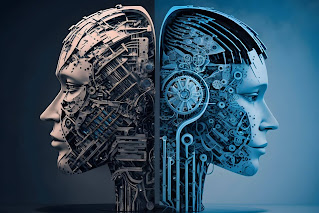The Convergence of Artificial Intelligence and Blockchain
Two of the most disruptive technologies to emerge in recent years are artificial intelligence (AI) and blockchain. Though originally developed to fulfill different purposes, these technologies are increasingly intersecting to create powerful new applications. The fusion of AI and blockchain promises to transform many industries.
AI excels at analyzing data, identifying patterns, and making predictions. It relies on vast amounts of data to train machine learning algorithms. Blockchain provides a decentralized, transparent digital ledger for recording transactions and data. The security, traceability, and integrity of blockchain systems make them ideal for maintaining data.
Using blockchain to store the data needed to train AI systems alleviates concerns regarding data integrity or manipulation. Data on a blockchain is immutable and can be traced back to its origin. Meanwhile, AI can be applied to optimize and automate processes within blockchain networks, increasing efficiency.
The synergies between AI and blockchain make them highly complementary. AI needs reliable data to learn from, while blockchain needs advanced analytics to maximize its potential. Integrating the two can lead to the creation of 'smart' blockchain platforms powered by AI.
For example, AI algorithms can provide enhanced security for blockchains by detecting network intrusions or suspicious transactions. In financial services, AI systems fed with blockchain data can be used for fraud prevention or to analyze investment trends. In healthcare, patient data on a blockchain could be utilized by AI assistants to provide diagnoses or recommend treatments.
As AI and blockchain continue to mature, we will see further innovative applications leveraging both technologies. However, there remain challenges to overcome around scalability, interoperability, and regulation. Businesses looking to capitalize on this integration must focus on developing robust AI models powered by high-quality, reliable data made available through blockchain systems. With thoughtful design, AI-enabled blockchain solutions have the potential to drive profound change.
Some industries that can benefit from the convergence of artificial intelligence and blockchain technology:
- Financial Services - AI algorithms can analyze blockchain transaction data to detect fraud, make investment predictions, and automate trading. Smart contracts enabled by AI can automate financial processes.
- Healthcare - Medical records can be stored securely on blockchains and analyzed by AI to provide better preventative care and personalized treatment plans. AI models can be trained using healthcare data.
- Supply Chain Management - Blockchain provides transparency into supply chains while AI can optimize logistics operations, predict delays, and automate inventory management.
- Retail - Blockchain transaction records can feed AI systems valuable shopping data to improve customer experience through customized recommendations and targeted marketing.
- Government - AI tools can increase security, reduce fraud, and optimize operations of government systems built on blockchain platforms for identity management, benefits disbursement, and record-keeping.
- Insurance - AI can process claims and analyze blockchain data containing policyholder information to provide personalized coverage options and pricing. Smart contracts can automate policy administration.
- Energy - Blockchains are enabling decentralized energy grids powered by AI systems controlling energy distribution, billing, and predicting usage.
- Media - Blockchain content distribution networks with AI capabilities can accurately track engagement, optimize recommendations, and provide stronger copyright protections.
The ability to leverage the strengths of both AI and blockchain technology will enable breakthroughs in these industries and beyond. As the integration progresses, more transformative use cases will emerge.
Labels: artificial intelligence, blockchain, convergence, jorge sebastiao, trust

























